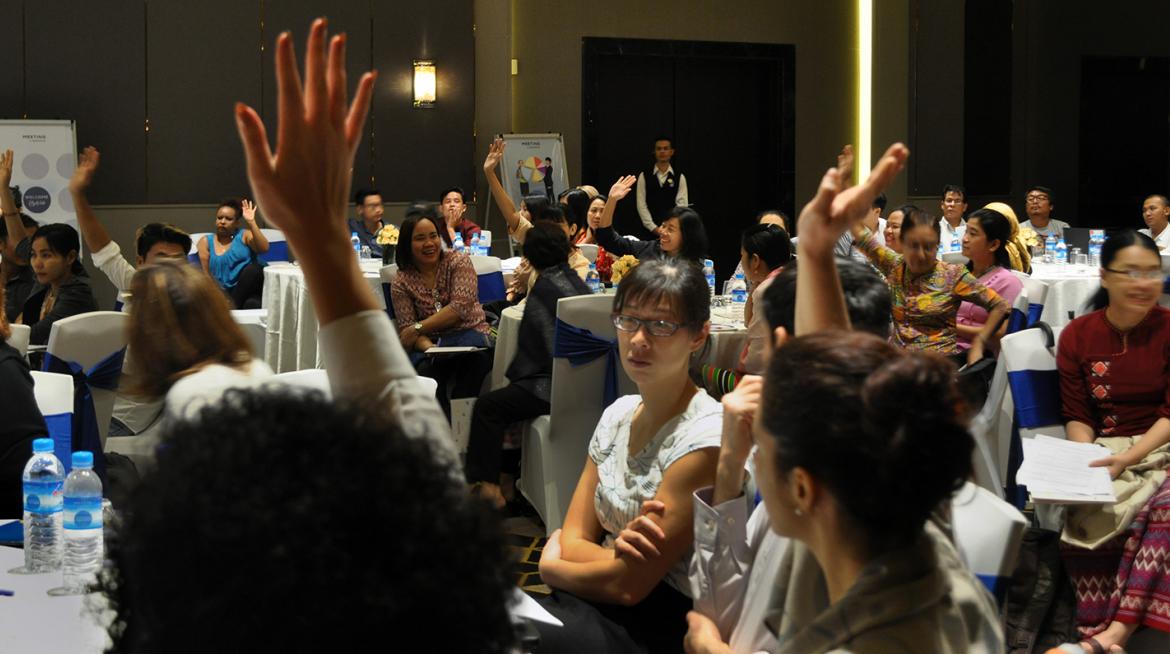
LIFT renewed its commitment to women’s empowerment and gender equality, launching its new Gender Strategy 2017 with a capacity building workshop on 16 August in Yangon. Representatives from 38 LIFT partner organisations participated in the workshop with LIFT Fund Management Office staff.
LIFT’s first gender strategy (2012) was reviewed in early 2016. The review found that from 2012 to 2015 LIFT was increasingly mainstreaming gender into its programmes and monitoring and evaluation systems. However, it also found that without a clear gender implementation plan it was difficult to track LIFT’s progress. This made it challenging to identify gaps and opportunities for achieving greater gender equality and women’s empowerment through LIFT’s work.
In response, LIFT created a new Gender Strategy, clarifying the approach for implementation, with an associated Gender Action Plan that serves as an internal monitoring document for LIFT. The strategy further defines possible and required interventions for each partner organisation, and provides suggestions for each of the target areas of LIFT’s work.
LIFT held a capacity building workshop for its partners at the launch. The workshop presented the new strategy to implementing partners, and helped participants create gender working groups in LIFT’s key thematic areas. It also connected partners with each other for reflection and discussion about how gender equality and women’s empowerment could be improved in their projects.
Gender Strategy Launch
Ms. Claudia Antonelli, LIFT's Fund Board member from the European Union Delegation to Myanmar, opened the launch. She said that while Myanmar was facing many challenges achieving equality, gender-based discrimination was a global issue faced by all countries.
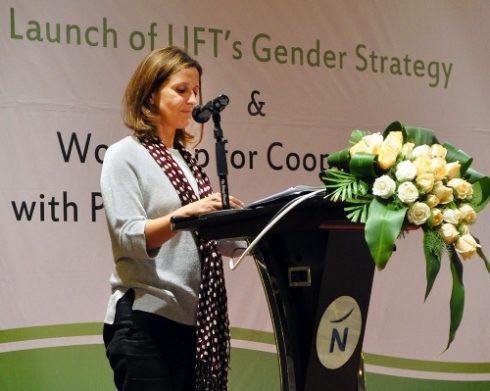
Ms. Claudia Antonelli, Fund Board Member from the European Union Delegation to Myanmar. Photo: LIFT
Ms. Nora Pistor, LIFT's Gender Specialist Consultant, presented the results of a gender survey completed by LIFT implementing partners to highlight the need for a new gender strategy and capacity training for partners.
Ms. Pistor said survey responses showed that while most partner organisations knew about gender issues and collected sex-disaggregated data in their projects, there were also significant gaps in technical knowledge. These included gender-responsive budgeting, gender-sensitive communications and gender in monitoring and evaluation.
The majority of survey participants emphasised their need to learn more about gender for the practical integration of gender into their projects and welcomed LIFT’s initiative to “step up” gender equality.
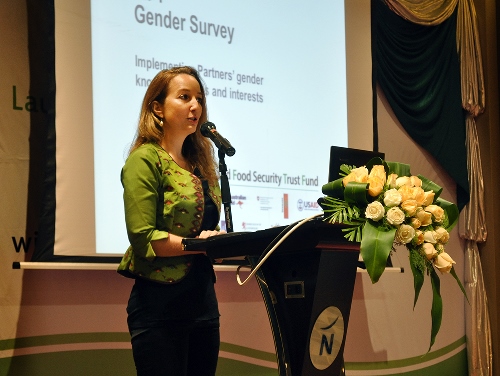
Ms. Nora Pistor, LIFT Gender Specialist Consultant. Photo: LIFT
Capacity building workshop and forming working groups
LIFT Social Protection and Gender Officer Ms. Khin Hnin Phyu and Ms. Pistor began the workshop by introducing the key objectives of LIFT’s new gender strategy:
- achieving gender equality and women’s empowerment, emphasizing that ‘men and women are not the same but that they are entitled to equal rights and opportunities, to resources, power and control, decision making and self-worth.’
- recognising that the diverse needs and interests of women and men, girls and boys is crucial to designing and implementing effective projects.
Ms. Pistor gave examples of how gender was relevant to all programme thematic areas. Nutrition programmes that only target mothers and children are far less likely to succeed without encouraging male participation. This is because many mothers do not have the freedom to purchase household foods without the approval of their husband, in-laws and wider community.
Initial research in Myanmar has shown that labour is highly gender-segregated and often results in barriers to women accessing and controlling land, finance, market information and extension services, all of which are influenced by longstanding gender norms, Ms Pistor said.
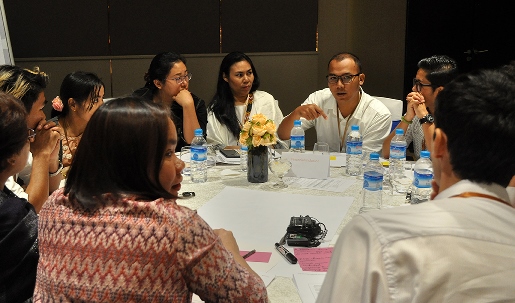
The financial inclusion working group discusses gender goals for their projects. Photo: LIFT
Participants were split into five tables by thematic area: social protection and strengthening civil society; migration; nutrition; inclusive value chains; and financial inclusion. Each group was asked to discuss the strengths and weaknesses of their projects in regards to gender, the activities they would like to pursue, and to formulate their own gender goals. Discussions were lively and candid, with high participation from all attendees. Participants' experience working on gender ranged from more than 5 years' experience to none.
Groups identified several overall challenges and goals. These included equal participation of men and women in projects, creating spaces for women to have a voice, measuring the impact of women’s empowerment programming, increasing gender awareness amongst all levels of staff and increasing the involvement of women in leadership.
Gender Mainstreaming
In the next session, Ms. Pistor presented on the process of integrating the gender dimension throughout the whole project cycle from the proposal design stage, to its implementation, and in the monitoring and evaluation, where gender mainstreaming plays a particularly important role for the success of a project. Participants found this particularly useful as a practical guide.
Gender mainstreaming, as stated in the Gender Strategy, is the approach taken to reach the goals of gender equality and women’s empowerment. The goal is for a certain way of thinking and acting to become everyday practice and a self-understood pattern of organisations.
The process of gender mainstreaming means assessing the implications for women and men in any planned action, including legislation, policies or programmes. It also means making women’s, as well as men’s, concerns and experiences an integral dimension of all projects. Women and men should benefit equally from all interventions, and inequality should not be perpetuated.
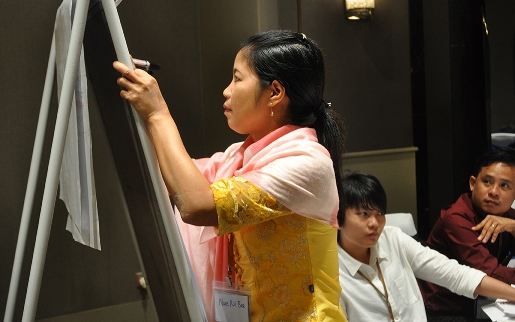
Ms. Nwe Ni Soe, Assistant Project Coordinator at METTA, writes disussion points for the inclusive value chains working group. Photo: LIFT
In the final discussion, working groups were asked to plan the Terms of Reference (TOR) for future meetings, and outline how LIFT could support them to implement their gender goals in their projects.
Michiko Ito from IOM was part of the migration working group. “We really appreciate LIFT running this workshop,” she said during the group presentations. “We knew about [gender mainstreaming] but we had to reach it on our own. This institutional support really helps us reach our goal, and now we don’t have to reinvent the wheel!”
The groups on financial inclusion, civil society and inclusive value chains all agreed to meet biannually. The nutrition and migration groups agreed to meet bimonthly. The working groups asked for LIFT’s support in technical assistance for gender mainstreaming their projects according to the new strategy.
LIFT’s new Gender Strategy can be found here.


